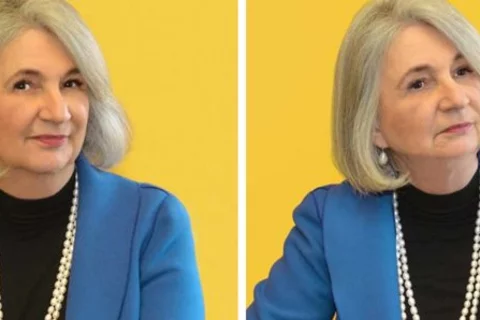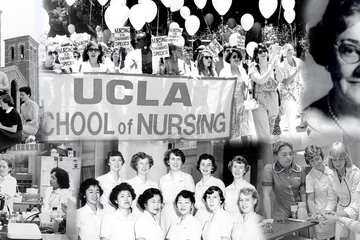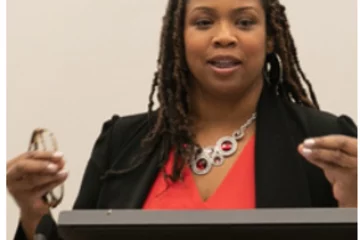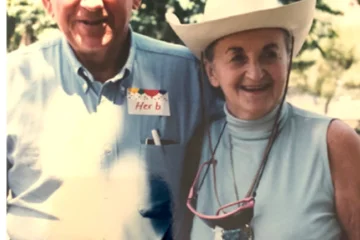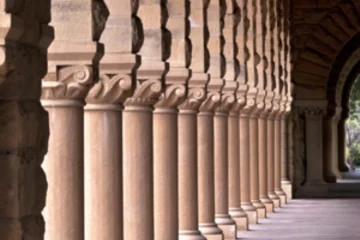A FIRST-TIME VISITOR TO DEAN LINDA SARNA’S OFFICE CAN’T HELP BUT NOTICE THE MEMORABILIA—CERTIFICATES OF APPRECIATION, PHOTOS, FLORENCE NIGHTINGALE FIGURINES—THAT ATTEST TO HER LIFELONG DEDICATION TO NURSING AND HEALTH CARE.
They serve as reminders of a career distinguished by academic achievement (Oncology Nursing Society Distinguished Researcher, Sigma Theta Tau International Nurse Researcher Hall of Fame, Fellow of the American Academy of Nursing), her internationally recognized scholarship in the field of tobacco control, and her decades of oncology research focused on patients with lung cancer. And, she just learned that she will be designated as an Edge Runner by the American Academy of Nurses for the Tobacco-Free Nurses program.
As she talks about her life and her hopes for the school, there’s something else a first-time visitor notices: a sense of calm and graciousness, indications of a life in which achievement and happiness successfully co-exist.
Q: You were appointed as dean in November, 2016. Can you talk about your transition into management?
- A: I was a professor here, and there was an opportunity for me to serve as the Chair of the Academic Senate in 2012. I fell in love with UCLA all over again because I got to interact with many different people across this wonderful campus. I also got the opportunity to implement the tobacco-free policy on campus which allowed me to work with more people who wouldn’t necessarily be part of my day-to-day work life.
After that ended, I came back to the School of Nursing. I was totally surprised when I was asked to serve as acting dean and then interim dean. From the moment I began, with the strong support of the faculty and staff, l gave it my all, to help the School be the best that it could be.
Q: And now the School of Nursing is recognized as one of the top programs in the country.
- A: I’m thrilled the school has received the recognition it deserves. We are rated in the top 5% of Schools of Nursing by U.S. News and No. 9 in terms of NIH (National Institutes of Health) funding, which is a metric for scholarship and research excellence. I am very proud of the legacy of the school, and I feel particularly responsible to maintain and improve it.
Q: Are there typical job duties that come with being dean?
- A: One dimension of a dean’s role is the internal workings of a school—making certain that everything is running well, and that concerns of faculty, staff and students are addressed. Another part is interacting with other campus leaders and with leaders in the UCLA Health System. I interface with Deans at the other UC nursing schools as well nursing leaders nationally and globally.
I also interact with the community. For almost 35 years, our School has run a health center on Skid Row. Our clinic provides an opportunity to give back to Los Angeles. It’s an important place for our students to learn what community- based care is and for finding better ways to care for the underserved.
Q: What are some of your goals for the school?
- A: I told the faculty and staff that I had three goals: excellence, sustainability and joy. This is an extraordinary time for nursing and nursing education. The public is becoming aware that educated nurses at advanced practice levels can be primary providers and that the registered nurse, the baccalaureate-prepared nurse, can provide expert care. There is great interest in becoming a nurse as reflected in the thousands of applications for our pre-licensure programs.
I want to continue our efforts to increase collaboration with the nurses in UCLA Health. I also hope to increase the collaborative opportunities for our nurse scholars. I think the future is very much about inter-professional education and scholarship. I am hoping that we can do more to expand education in mental health and substance abuse. We have strong partnerships with a number of organizations and scholars around the world and I hope to expand our international collaborations in nursing education and research. We are considering expanding opportunities for online educational programs too.
Q: It seems as though the country will need more nurses in the future.
- A: There’s a nursing shortage—not just bedside nurses but nurse educators and scholars. Our Ph.D. program produces those who will educate the next generation and produce the science that will improve health and nursing care.
Q: Let’s talk about your family for a minute.
- A: My daughter and son, who have been with me through this journey, were little kids when I was commuting to San Francisco to get my doctorate. They have been huge supporters, as has my husband, who is an oncologist at Cedars Sinai Medical Center. He understands the academic lifestyle, and I couldn’t have done it without him. He also appreciates the difference I’ve been able to make.
Q: I’ve read that you’re an Anglophile.
- A: I am a big fan of all things English. I love my English garden and hosting tea parties. I collect Victorian Staffordshire pottery and make award-winning marmalade.
My sister, Roberta, and I pooled our money to purchase a dress of Princess Diana’s at an auction, which we have shared with charitable organizations. It is about to go on display (at Kensington Palace in London) as part of an exhibit that is tied to the 20th anniversary of her death.
I appreciated that Diana shone a positive light on nursing. She was involved with the underserved and those in need, especially those with HIV-AIDS. I admired her for that.
Q: Any last words?
- A: I am thrilled to be the Dean as the School celebrates its 70th birthday. Because I know and appreciate our rich legacy, I look forward to showcasing the School’s many accomplishments as well as highlighting the exciting scholarship that will impact nursing and health care. We have a bright future.
—Alice Short is a former editor of the Daily Bruin and worked at the L.A. Times for more than 20 years, most recently as an assistant managing editor.
